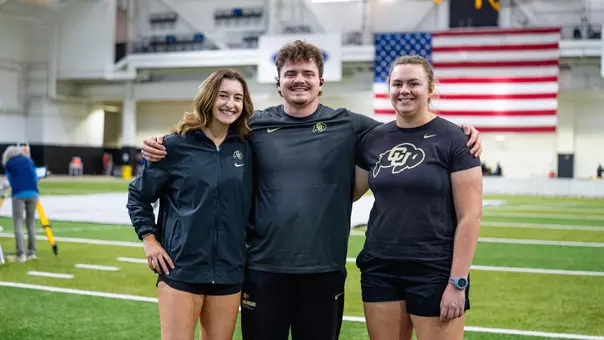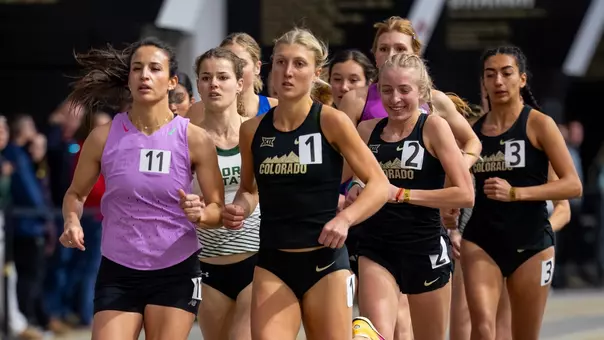Colorado University Athletics
CU To Honor Hall Of Famer Cliff Branch During Friday's TCU Game
September 01, 2022 | Football, Track and Field, Alumni C Club, Neill Woelk
"He literally changed the game."
If you need one sentence to describe former Colorado great and NFL Hall of Famer Cliff Branch's impact on the game, there couldn't be a better choice.
The speaker?
Try former San Francisco 49ers great Ronnie Lott, another Hall of Famer, who had the task of covering Branch when Lott was breaking into the NFL and Branch was breaking big plays for the Los Angeles Raiders.
"For the Raiders, he was the perfect weapon," Lott told ESPN earlier this year. "(Raiders owner) Al Davis recognized that to win games, you've got to have people to make big plays. Al Davis pioneered that element and it was dangerous. (Branch) literally changed the game. When he got that extra step, you paid for it."
Branch, who played for CU in 1970 and '71, passed away in 2019. An inductee into the CU Sports Hall of Fame in 2010, he was inducted posthumously into the Pro Football Hall of Fame earlier this year, becoming the first Buff ever to be honored in Canton.
Branch will be honored at Friday night's Colorado-TCU game at Folsom Field. A number of his former teammates will be on hand, as will his son, Brent, and granddaughter, Brentney. A highlight video of his career at CU and in the NFL will be shown between the first and second quarters, and a commemorative logo will grace the Folsom Field turf.
Branch proved to be an electrifying athlete from the moment he stepped onto the CU campus in 1970 to join Eddie Crowder's program after two years at Wharton County JC in Texas.
In his two years with the Buffs, Branch set CU and NCAA records for career touchdowns scored on kick returns, finishing with eight in those two seasons (six punts and two kickoffs) — an NCAA record that stood for three decades.
Branch was a threat to go the distance every time he touched the ball. He had four returns for scores in each of his two years with the Buffs, still single-season records for CU, as are his six career punt returns for scores.
He also caught 36 passes in his two years in Boulder — not big numbers by any means, but he produced those numbers in an era when Colorado was almost exclusively a power running team. Branch even contributed to that effort, finishing his career with 31 carries for 354 yards and five touchdowns while averaging an astounding 11.4 yards per carry.
And, he put an exclamation point on his versatility by completing two passes for 88 yards and a touchdown in his senior season.
But Branch's efforts weren't confined to the football field. At Colorado, he set numerous records on the track, including a blazing 10.0 in the 100-meter dash at the 1972 NCAA Championships — still a school record. He was also part of a 4x100 relay team that at one point had one of the fastest times in the world and he was part of 4x400 and mile relay teams that still hold CU school records — 50 years later.
Branch also set school records in the 60 and 300-yard dashes and was a two-time Big Eight indoor champ in the 60.
He was, quite simply, a once-in-a-generation athlete who is still regarded as perhaps the best sprinter in CU track and field history, and one of the most electrifying football players in Colorado annals.
How important was Branch to CU's success?
In 1971, when Colorado finished third in the nation, the Buffaloes' roster was peppered with stars like Charlie Davis, John Stearns, Bud Magrum, John Tarver, Bo Matthews and John Stavely.
But it was Branch who was named the team's winner of the Zach Jordan Award, given annually to the program's most valuable player.
"On a team, everybody needs to be on the same page," Branch said. "Playing on a team is more gratifying than an individual sport because it's about a group of guys trying to achieve the same goal. You have to be unselfish."
Had Branch decided to devote his attention to track on a full-time basis, he quite likely could have been a U.S. Olympian in 1972 or 1976.
But he decided to stay with football and became a fourth-round draft pick of the Raiders in 1972. There, after a relatively slow start in his first couple of years, his career took off. Working under the tutelage of another former Raiders great, Fred Biletnikoff, he became one of the most dangerous receivers in the NFL.
From 1974-80, his 6,047 receiving yards were the most in the NFL over that span. When he retired in 1985, he had more postseason catches (73) and yards (1,289) than any receiver in NFL history.
Branch's speed made it almost impossible for any cornerback to cover him man-to-man and he changed defensive philosophies in that era. Despite playing in a time when the running game was dominant and the rules favored defensive backs in the passing game (remember the bump and run?), Branch put up Hall of Fame statistics. He finished his career with 501 catches for 8,685 yards and 67 touchdowns — and three Super Bowl Rings, three All-Pro selections and four Pro Bowl berths to accompany those catches.
Tom Flores served as Branch's position coach with the Raiders early in his career before becoming the team's head coach in 1979. According to ESPN, Flores said opposing coaches regularly told him Branch was the player they feared most when preparing for the Raiders.
"There was fast and there was really fast," Flores said. "(Branch) was really fast and he caught the tough balls. They were going to have to adapt to him to keep him from running by them. He was a game changer."
In 2010, Branch was inducted into the CU Sports Hall of Fame. The honor definitely touched him.
"It's a very special honor to be recognized by your alma-mater," Branch said at the time. "I feel truly blessed. I'm a Buff all the way."





